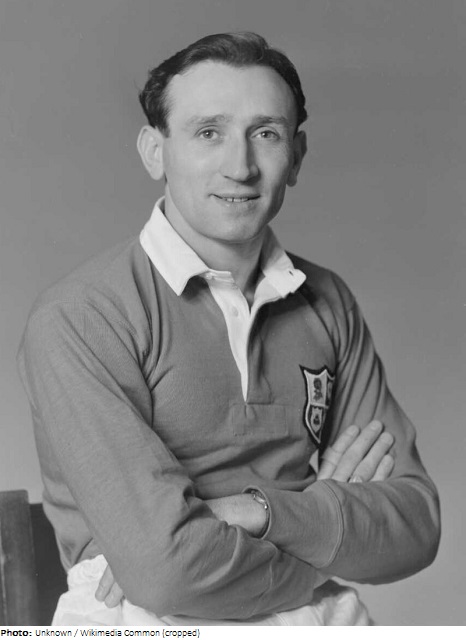
| Roles | Competed in Olympic Games |
|---|---|
| Sex | Male |
| Full name | Kenneth Jeffrey "Ken"•Jones |
| Used name | Ken•Jones |
| Born | 30 December 1921 in Blaenavon, Wales (GBR) |
| Died | 18 April 2006 (aged 84 years 3 months 19 days) in Newport, Wales (GBR) |
| Measurements | 180 cm / 75 kg |
| Affiliations | Newport Athletic Club |
| NOC |  Great Britain Great Britain |
| Medals | OG |
| Gold | 0 |
| Silver | 1 |
| Bronze | 0 |
| Total | 1 |
Kenneth Jeffrey Jones, a native of Blaenavon in southern Wales, was an Olympic champion in track and field for three days, but will be best remembered for his achievements in rugby.
Jones’s athletic talents first became apparent during his service with the RAF in India during World War II. In 1945, he won the 100y sprint at the All-India Games, and won the Welsh title in the 100 and 220y. In 1946 he joined the Newport rugby side, where he would play until his farewell from sports in 1958. The same season, he was selected for the Welsh national team to play England in the first match of the 1947 Five Nations Tournament.
As the anchorman of the British 4×100 m relay team at the 1948 Olympics in London, Jones finished second behind the US. However, the jury disqualified the American team because of an irregular exchange, and the British team was awarded the gold medal. Three days later, after examining film material of the race, the disqualification was overturned, and the Americans were reinstated as Olympic champions. Another runner on the UK relay team, Jack Gregory, was also a rugby international. He played his only cap (for England) against Wales, which had Jones in their line-up.
Jones played 44 international matches for Wales (of which 43 consecutive), a world record that stood for 20 years. The wingman scored a total of 17 tries, and captained his team once. In his active years, Wales won the Five Nations 6 times, twice by winning all four matches (Grand Slam). Jones also played for the British Lions in their 1950 tour of New Zealand and Australia. His best remembered feat, however, is the game-winning try he scored in the 1953 game between Wales and New Zealand at Cardiff, marking the last time the Welsh rugbyers defeated the All-Blacks.
His record in track running features a multitude of Welsh titles, winning the sprint double 7 times, while scoring a triple by adding the long jump in 1949. Besides the 1948 Olympics, he took part in two major championships, both in 1954 (his last year in athletics). At the European Championships in Bern, he won a silver medal with the British 4×100 m relay team (with Ken Box, Brian Shenton, and the non-Olympian George Ellis), and at the 1954 British Empire and Commonwealth Games in Vancouver, he won a bronze in the 220 yards and finished six in the 100 yards.
He was named the first Welsh Sportsman of the Year in 1955, and awarded the OBE in 1960. When the 1958 British Empire and Commonwealth Games were held in Cardiff, Jones was asked to be the final runner to carry the baton with a message from the Queen during the opening ceremony, an honour comparable with being the final torchbearer in the opening ceremony of the Olympics. In 1990, he was one of the first ten inductees in the Welsh Sports Hall of Fame.
A high school teacher for most of his life, Jones also worked as a rugby reporter for more than two decades, and served on the board of the Newport rugby club. He resigned as the president of the club in 1995, in protest of the introduction of professionalism in the sport. After a stroke, he was confined to a wheelchair for the final years of his life.
Personal Best: 100 - 10.6 (1948).
| Games | Discipline (Sport) / Event | NOC / Team | Pos | Medal | As | |
|---|---|---|---|---|---|---|
| 1948 Summer Olympics | Athletics |  GBR GBR |
Ken Jones | |||
| 100 metres, Men (Olympic) | 6 h2 r3/4 | |||||
| 4 × 100 metres Relay, Men (Olympic) | Great Britain | 2 | Silver |